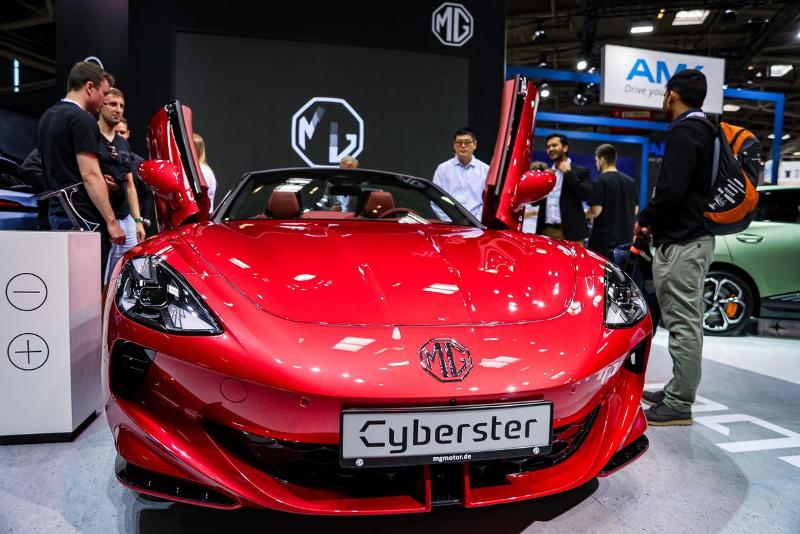As a content writer with a deep understanding of the electric vehicle industry, I am excited to explore the rise of Chinese electric car sales in Europe. In this article, we will delve into the challenges and opportunities that this trend presents for both Chinese manufacturers and European automakers. From the establishment of local factories to joint ventures and the potential impact of tariffs, we will examine how this sales onslaught could reshape the European electric car market. Let's dive in!
Chinese Electric Car Manufacturers: Establishing a Presence in Europe
Explore how Chinese electric car manufacturers are making their mark in Europe and establishing local factories and joint ventures.
Chinese electric car manufacturers are actively establishing a presence in Europe, recognizing the immense potential of the European market. Companies like BYD and SAIC's MG have already set up factories, enabling them to produce vehicles locally and cater to the European demand. Additionally, joint ventures with local European companies are being formed, allowing for knowledge sharing and leveraging existing networks.
By establishing a local presence, Chinese manufacturers can overcome challenges such as tariffs and shipping costs, while also building trust with European consumers. This strategic move sets the stage for increased collaboration and competition in the European electric car market.
Challenges in the European Electric Car Market
Discover the challenges that Chinese electric car manufacturers face in the European market and the potential impact on sales.
While Chinese electric car manufacturers have ambitious plans for the European market, they are not without challenges. One of the key obstacles is the perception of Chinese-made vehicles, which has been shaped by past quality issues and copycat designs. Overcoming these negative perceptions and building trust among European consumers will be crucial for Chinese manufacturers to gain market share.
Furthermore, the European market already has established players, such as BMW, Mercedes, Audi, and Porsche, who have a strong foothold. Chinese manufacturers will need to offer competitive pricing, high-quality vehicles, and an extensive charging infrastructure to stand out and attract European buyers.
Additionally, geopolitical tensions between China and Europe can impact the success of Chinese electric car sales. Any direct confrontation or trade restrictions could disrupt supply chains and create uncertainty in the market. It is important for manufacturers to navigate these challenges and adapt their strategies accordingly.
Opportunities for Collaboration and Growth
Explore the opportunities for collaboration and growth between Chinese and European electric car manufacturers.
Amidst the challenges, there are significant opportunities for collaboration and growth between Chinese and European electric car manufacturers. Joint ventures not only enable technology sharing but also foster innovation and create synergies. By leveraging each other's strengths, manufacturers can develop cutting-edge electric vehicles that meet the evolving needs of consumers.
Furthermore, as the demand for electric vehicles continues to rise, there is a need for a robust charging infrastructure. This presents an opportunity for Chinese and European manufacturers to collaborate and invest in the development of a comprehensive charging network across Europe. By working together, they can accelerate the adoption of electric vehicles and address one of the key concerns of potential buyers.
The Future of Chinese Electric Car Sales in Europe
Gain insights into the potential future of Chinese electric car sales in Europe and the factors that may impact their growth.
The future of Chinese electric car sales in Europe holds immense potential, but it is also subject to various factors. Battery technology advancements, cost reductions, and improvements in charging infrastructure will play a crucial role in shaping the growth trajectory. As battery prices continue to decrease and charging infrastructure becomes more widespread, the barriers to entry for Chinese manufacturers will diminish.
Additionally, consumer perception and acceptance of Chinese-made electric vehicles will also be pivotal. By addressing quality concerns, offering competitive pricing, and showcasing technological advancements, Chinese manufacturers can win over European consumers and gain a significant market share.
Overall, the rise of Chinese electric car sales in Europe presents both challenges and opportunities. By overcoming obstacles, collaborating with European counterparts, and continuously innovating, Chinese manufacturers have the potential to reshape the European electric car market and drive the transition towards sustainable transportation.
Conclusion
In conclusion, the rise of Chinese electric car sales in Europe presents a significant shift in the automotive industry. Chinese manufacturers are establishing a strong presence by setting up local factories and forming joint ventures with European companies. However, they also face challenges such as negative perceptions and competition from established players.
Despite these challenges, there are ample opportunities for collaboration and growth. By leveraging each other's strengths, Chinese and European manufacturers can develop innovative electric vehicles and invest in a comprehensive charging infrastructure. The future of Chinese electric car sales in Europe depends on advancements in battery technology, pricing competitiveness, and consumer acceptance.
As the industry evolves and adapts, it is essential for manufacturers to navigate geopolitical tensions and continuously innovate to meet the evolving needs of consumers. The European electric car market is poised for transformation, and Chinese manufacturers have the potential to play a significant role in shaping its future.
FQA :
What are the main challenges faced by Chinese electric car manufacturers in Europe?
Chinese electric car manufacturers in Europe face challenges such as negative perceptions, competition from established players, and geopolitical tensions that can impact supply chains and market stability.
What opportunities exist for collaboration between Chinese and European electric car manufacturers?
Collaboration opportunities include joint ventures for technology sharing, innovation, and the development of a comprehensive charging infrastructure. By leveraging each other's strengths, manufacturers can drive the adoption of electric vehicles and address consumer concerns.
What factors will shape the future of Chinese electric car sales in Europe?
Advancements in battery technology, pricing competitiveness, and improvements in charging infrastructure will be key factors shaping the future of Chinese electric car sales in Europe. Additionally, consumer perception and acceptance of Chinese-made vehicles will play a crucial role.

